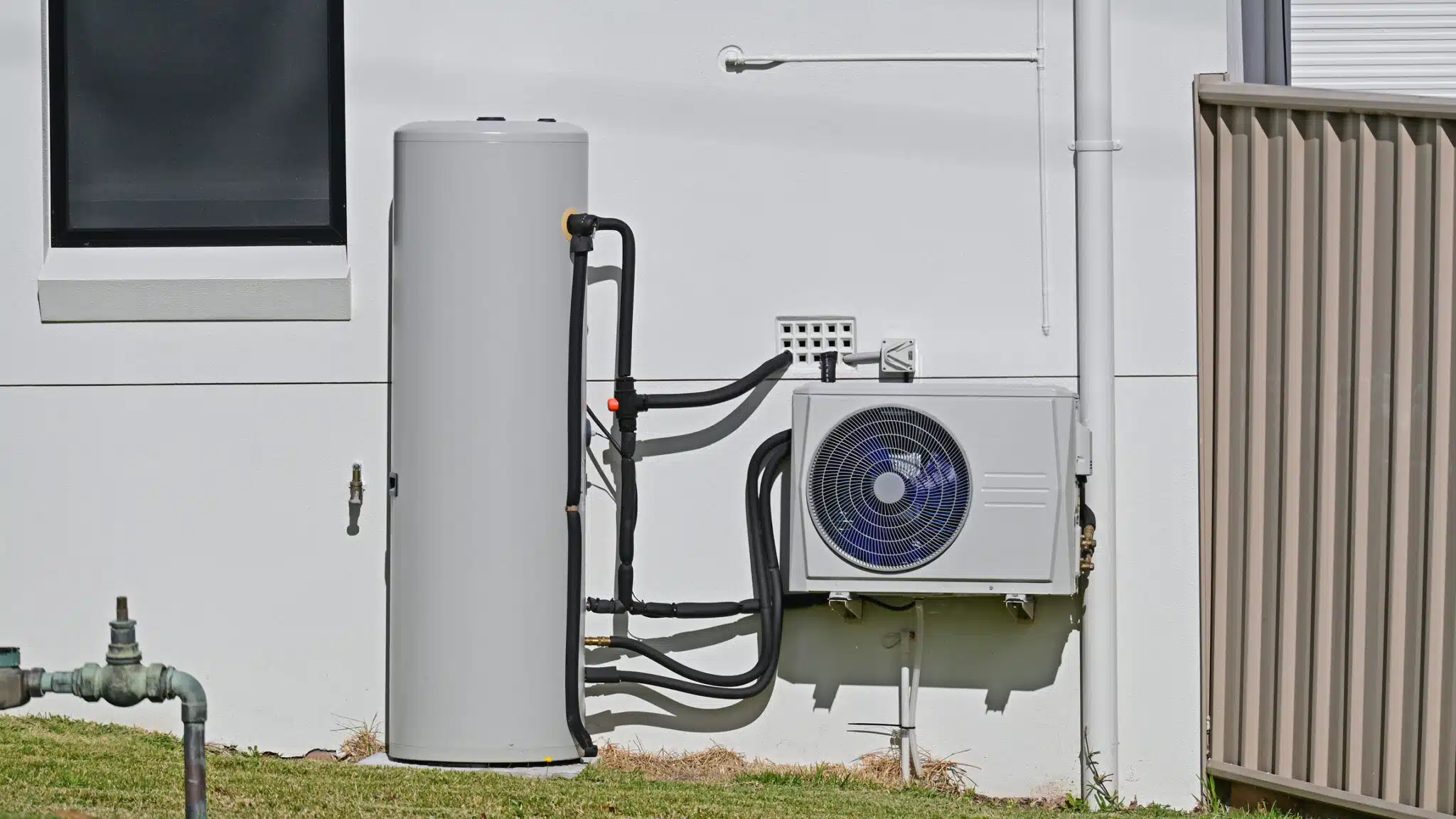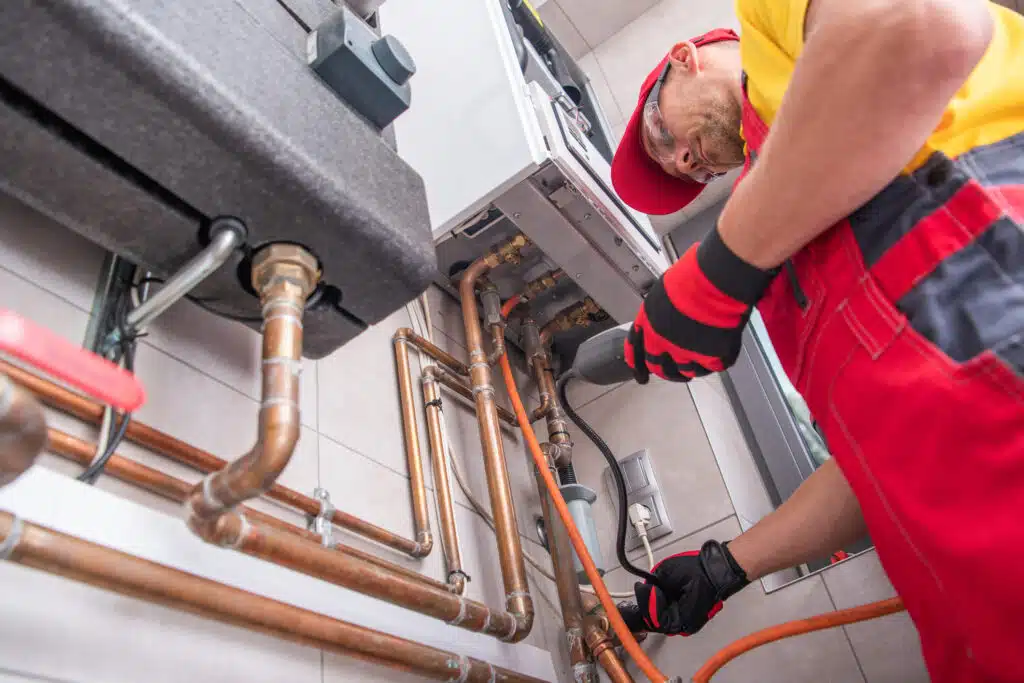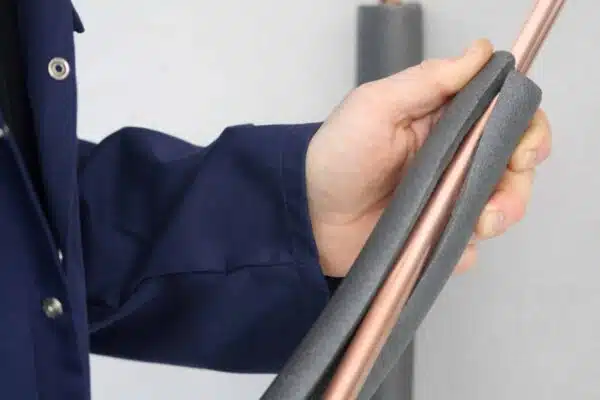In the quest for more sustainable living and cost-effective home solutions, heat pump water heaters are emerging as a standout choice for homeowners in Lancaster, PA, and beyond. These innovative systems harness environmental heat from the surrounding air to heat water, offering a greener alternative to traditional gas or electric water heaters. Not only do they reduce the household’s carbon footprint, but they also significantly lower monthly utility bills, making them an attractive option for cost-conscious residents.
For those living in York, PA, and Harrisburg, PA, the benefits of switching to heat pump water heaters extend beyond just energy efficiency. These systems provide consistent and reliable hot water supply, ensuring that daily comfort is never compromised. Whether it’s for showers, laundry, or dishwashing, homeowners can enjoy the convenience of ample hot water without the guilt of high energy consumption.
Heat pump water heaters are designed to integrate seamlessly into existing plumbing systems, making the transition smooth and hassle-free. This ease of installation, combined with long-term savings on energy bills, presents a compelling case for their adoption. As more people in Lancaster and its surrounding areas look towards sustainable living options, these water heaters stand out as a practical choice for enhancing home comfort and efficiency.
As we delve deeper into the specifics of how heat pump water heaters operate and the variety of models available, it becomes clear why they are becoming a preferred choice for many. Their ability to maintain performance while cutting costs is revolutionizing how we think about residential water heating. This introduction to heat pump water heaters sets the stage for a deeper exploration of their benefits, installation processes, and the potential impact on your home and lifestyle.
What Are Heat Pump Water Heaters?
Heat pump water heaters represent a significant advancement in residential water heating technology. Unlike traditional models, these systems utilize the ambient air temperature to heat water, making them more energy-efficient and environmentally friendly. This process not only conserves energy but also reduces reliance on fossil fuels, which is crucial for sustainable living. In cities like York, PA, where energy efficiency and sustainability are valued, these water heaters are becoming increasingly popular.
The core technology behind heat pump water heaters is their ability to transfer heat from one place to another, rather than generating heat directly. This method is similar to how a refrigerator works, but in reverse. Inside the unit, a refrigerant captures heat from the surrounding air, even in cooler climates, and compresses it to increase the temperature. This heated refrigerant then transfers its heat to the water, efficiently warming it up without excessive energy use.
For residents of Harrisburg, PA, adopting heat pump water heaters can be particularly beneficial due to their operational efficiency in varying climates. These systems are designed to work effectively even in colder temperatures, a common concern in many regions. By extracting heat from the air, they manage to operate smoothly and provide consistent hot water, which is essential for daily comfort and convenience in any household.
Understanding the operational dynamics of heat pump water heaters helps homeowners appreciate the balance between technology and practicality they offer. These systems not only support a more sustainable lifestyle but also cater to the everyday needs of modern households. With their ability to deliver reliable hot water while cutting monthly utility costs, they represent a smart investment in both comfort and sustainability.

How Heat Pump Water Heaters Work
Understanding how heat pump water heaters operate is key to appreciating their efficiency and environmental benefits. These systems function by extracting heat from the surrounding air, utilizing a process that is fundamentally different from traditional heating methods. Essentially, they operate on the same principle as a refrigerator, but in reverse, pulling in heat from the air, which is then used to warm the water. This method is highly efficient, as it uses less energy than generating heat directly.
The core component of heat pump water heaters is the evaporator, which absorbs ambient heat from the air. This absorbed heat is transferred to a refrigerant, a fluid with a low boiling point, which is then compressed by a compressor. As the refrigerant is compressed, its temperature rises significantly. This hot refrigerant then flows through a heat exchanger, where the heat is transferred to the cold water from the home’s plumbing system, effectively heating the water.
In areas like York, PA, where energy efficiency is increasingly prioritized, the adaptability of heat pump water heaters to different climates adds to their appeal. These systems are capable of functioning efficiently even in cooler temperatures, making them a practical choice for a variety of environments. The technology behind these systems ensures that they can still extract heat from cooler air, which is a testament to their versatility and suitability for diverse American climates.
For residents of Harrisburg, PA, and similar locales, the consistent performance of heat pump water heaters means reliable access to hot water without the high energy costs associated with traditional water heaters. The operational efficiency of these systems not only supports sustainable living but also provides substantial savings on utility bills. By understanding the mechanics behind heat pump water heaters, homeowners can make informed decisions about integrating these systems into their homes for enhanced comfort and efficiency.
Comparing Efficiency: Heat Pump Water Heaters vs. Traditional Models
When comparing the efficiency of heat pump water heaters to traditional models, the differences are quite striking. Traditional water heaters, whether gas or electric, operate by directly heating water using an energy source, which can be inefficient and costly. Heat pump water heaters, on the other hand, utilize existing heat in the air, significantly reducing the amount of electricity or gas needed to heat water. This method can lead to considerable energy savings and is a more sustainable option for homeowners in areas like York, PA, where energy costs can fluctuate.
Heat pump water heaters are not only more energy-efficient but also environmentally friendlier than their traditional counterparts. By relying on ambient heat, these units cut down on the consumption of non-renewable resources, thus reducing the home’s carbon footprint. This is particularly appealing in cities like Harrisburg, PA, where environmental sustainability is becoming increasingly important to residents. Traditional models, by contrast, often burn fossil fuels, contributing to higher CO2 emissions and greater environmental impact.
The operational cost is another area where heat pump water heaters shine in comparison to traditional models. While the initial installation cost of heat pump water heaters might be higher, the long-term savings on utility bills can be significant. Traditional water heaters typically have higher operating costs because they need to expend more energy to heat water from scratch, whereas heat pump water heaters are more about moving heat that already exists, which requires less energy.
Moreover, the lifespan of heat pump water heaters often surpasses that of traditional models, offering another layer of cost-efficiency over time. Traditional water heaters, which frequently run at full capacity and undergo more intense heating cycles, tend to wear out faster. This means homeowners might face replacement costs sooner than with heat pump water heaters, which operate more gently and efficiently. This aspect makes heat pump water heaters an attractive long-term investment for enhancing home comfort and efficiency.
The Environmental Benefits of Heat Pump Water Heaters
The environmental benefits of heat pump water heaters extend far beyond individual homes in Lancaster, PA. By using ambient heat from the air, these systems significantly reduce the consumption of non-renewable energy sources. This shift not only helps in conserving natural resources but also plays a crucial role in reducing greenhouse gas emissions. As communities like York, PA, grow more conscious of their environmental impact, adopting such technologies becomes increasingly important.
Furthermore, heat pump water heaters contribute to improved air quality by minimizing the emission of pollutants. Traditional heating methods often involve burning fossil fuels, which release harmful substances like carbon dioxide and nitrogen oxides into the atmosphere. By contrast, heat pump water heaters operate more cleanly, relying on electricity and the natural heat available in the environment. This makes them a healthier choice for both the planet and the people living on it.
In areas like Harrisburg, PA, where environmental sustainability is a growing concern, the adoption of heat pump water heaters can be part of a broader strategy to combat climate change. These systems are not only efficient but also align well with renewable energy sources such as solar and wind power. When combined, these technologies can drastically reduce a household’s carbon footprint, making a significant contribution to global environmental goals.
The cumulative impact of widespread adoption of heat pump water heaters can be transformative. By reducing dependency on fossil fuels and lowering emissions, communities can achieve cleaner, more sustainable environments. This aligns with global efforts to tackle climate change and promotes a healthier, more sustainable future for all. As more homeowners in Lancaster and its surrounding areas recognize these benefits, the shift towards heat pump water heaters could accelerate, leading to greater environmental improvements over time.
Installation Considerations for Heat Pump Water Heaters
When considering the installation of heat pump water heaters, there are several factors that homeowners should take into account to ensure optimal performance and efficiency. First, it’s important to evaluate the space available, as these units require sufficient room to capture ambient heat from the air. This space requirement is crucial for the system’s evaporator to function effectively, making it a key consideration during the planning stage. Homeowners in York, PA, should consult with local experts to find the best location for installation, ensuring the unit operates efficiently throughout the year.
Another critical aspect of installing heat pump water heaters is understanding the climate’s impact on their efficiency. Although these systems are designed to perform well in a variety of weather conditions, extreme cold can affect their efficiency. In Harrisburg, PA, where winter temperatures can dip significantly, supplemental heating systems may be necessary. This ensures that the water heater maintains its efficiency, even during colder months, providing reliable hot water supply without excessive energy use.
The electrical requirements for heat pump water heaters also deserve careful consideration. These systems generally require a 240-volt electrical connection, which is more powerful than standard electrical outlets. Homeowners may need to upgrade their existing electrical systems to accommodate this requirement, which could involve additional costs. Consulting with a qualified electrician who can assess and make necessary adjustments is advisable to ensure that the system is installed safely and correctly.
Lastly, it’s beneficial for homeowners to understand the potential need for regular maintenance to keep heat pump water heaters running smoothly. Regular checks and servicing can help extend the lifespan of the unit and maintain its efficiency over time. This proactive approach not only helps in preventing unexpected breakdowns but also ensures that the system continues to provide cost-effective service in heating water for the home. By considering these installation factors, residents can maximize the benefits offered by heat pump water heaters, enhancing both comfort and sustainability in their homes.
Cost Analysis: Initial Investment vs. Long-Term Savings
When considering the financial implications of heat pump water heaters, it’s essential to analyze both the initial investment and the long-term savings. Initially, these systems may seem costly compared to traditional water heaters. However, the higher upfront cost is offset by significant reductions in monthly utility bills over time. Homeowners in York, PA, for example, can benefit from these savings, making the investment worthwhile in the long run.
The efficiency of heat pump water heaters plays a crucial role in their ability to save money. By utilizing the ambient air to heat water, these systems consume considerably less energy than traditional models. This reduced energy usage directly translates into lower electricity or gas bills. In Harrisburg, PA, where energy costs can fluctuate, having a system that minimizes energy consumption can lead to substantial financial benefits.
Moreover, the longevity of heat pump water heaters adds to their cost-effectiveness. These units typically have a longer lifespan compared to conventional water heaters due to their less intensive heating process. This durability means fewer replacements and repairs, contributing further to the long-term savings. Residents considering these systems should factor in this extended operational life when calculating the overall cost benefits.
In conclusion, while the initial price of heat pump water heaters may be higher, the long-term financial benefits are undeniable. These systems not only provide a sustainable solution to residential heating needs but also offer ongoing savings that can significantly offset the initial investment. For homeowners looking to enhance their home’s efficiency while reducing long-term costs, heat pump water heaters present a compelling option.
Maintenance Tips for Heat Pump Water Heaters
Maintaining your heat pump water heaters is crucial to ensuring they operate efficiently for years. Regular maintenance not only extends the lifespan of these units but also ensures they continue to run at peak efficiency. Homeowners in York, PA, can keep their systems in top condition by following a few simple tips. By adhering to these guidelines, you can avoid common issues that might impair the performance of your water heater.
Firstly, it’s important to check and clean the air filters regularly. Heat pump water heaters rely on air flow to function effectively, and clogged filters can restrict this flow, reducing efficiency. Cleaning or replacing the filters every three months is a good practice. This simple step can prevent larger, more costly problems down the road and keeps your system running smoothly.
Another key aspect of maintenance is to check the area around the unit. Ensure that it’s free from debris and dust that can accumulate and hinder the system’s ability to absorb heat. Residents of Harrisburg, PA, should particularly ensure that their outdoor units are clear of leaves, pollen, and other outdoor elements, especially after storms or high winds. This helps maintain the necessary airflow that these heaters need to operate effectively.
Lastly, it’s advisable to schedule an annual check-up with a professional technician. They can perform more comprehensive checks and address issues like checking the refrigerant levels, inspecting electrical connections, and ensuring the compressor and evaporator are functioning properly. These professional assessments can help detect potential problems early, reducing the risk of unexpected breakdowns and ensuring that your heat pump water heater continues to provide efficient service. With these maintenance tips, homeowners can enjoy sustained performance and reliability from their heat pump water heaters.
Real-Life User Experiences with Heat Pump Water Heaters
Real-life experiences with heat pump water heaters offer valuable insights into their practical benefits and everyday usability. Many homeowners in York, PA, have shared positive feedback about the significant reduction in their monthly utility bills. This consistent saving is often highlighted as one of the most compelling reasons for their satisfaction. Additionally, users appreciate the quiet operation of these systems, which contrasts sharply with the noise levels of traditional water heaters.
Residents of Harrisburg, PA, have noted the reliability of heat pump water heaters in providing a steady supply of hot water, even during colder months. One user mentioned the initial skepticism about the heater’s performance in low-temperature conditions but was pleasantly surprised by its efficiency and effectiveness. This adaptability to various weather conditions is a frequently praised feature, confirming the system’s robustness and advanced technology.
Moreover, families have reported an improvement in their home’s energy efficiency ratings, an aspect that adds value to their property and aligns with their environmental goals. The eco-friendly nature of heat pump water heaters is a strong selling point, as more homeowners seek sustainable living options. This shift towards green technology not only supports the environment but also enhances the overall appeal of adopting such systems.
Feedback also extends to the ease of integration of heat pump water heaters into existing home infrastructures. Users have commented on the straightforward installation process, managed by professionals, which made the transition smooth and hassle-free. The long-term durability and minimal maintenance requirements are additional benefits that users frequently acknowledge, making heat pump water heaters a preferred choice for modern, eco-conscious households.

Frequently Asked Questions
What are heat pump water heaters and how do they work?
Heat pump water heaters are innovative devices that efficiently transfer heat from the surrounding air to water in a storage tank. They operate on the same principle as refrigerators but in reverse, extracting heat and amplifying it before transferring it to water. This process is not only energy-efficient but also environmentally friendly, as it reduces the reliance on fossil fuels for heating water. By using electricity to move heat rather than generate it, heat pump water heaters can provide significant savings on monthly energy bills.
How do heat pump water heaters enhance home comfort?
Heat pump water heaters enhance home comfort by providing a steady and reliable supply of hot water, ensuring that your daily routines are uninterrupted. They operate more quietly than traditional water heaters, contributing to a more peaceful home environment. Additionally, these units help maintain better indoor air quality by minimizing the dry air output often associated with conventional heating methods. By integrating seamlessly into home heating systems, heat pump water heaters also free up space, typically occupied by larger, less efficient systems.
What are the key benefits of using heat pump water heaters?
Heat pump water heaters offer several key benefits, making them an excellent choice for eco-conscious homeowners. Firstly, they are significantly more energy-efficient than traditional models, which can lead to lower electricity bills. Additionally, their operation is environmentally friendly as they reduce carbon emissions by utilizing ambient air for heating water. Moreover, these systems are known for their longevity and less frequent need for repairs, providing a reliable and sustainable solution for residential hot water needs.
How cost-effective are heat pump water heaters compared to traditional models?
Heat pump water heaters are notably cost-effective compared to traditional models, primarily due to their superior energy efficiency. By extracting heat from the air, these heaters use significantly less electricity, which can translate into considerable savings on utility bills over time. Furthermore, their durability and reduced maintenance needs further enhance their cost-effectiveness, potentially offsetting the initial investment. As a result, homeowners looking to minimize long-term expenses often find heat pump water heaters to be an advantageous choice.
What should consumers look for when choosing a heat pump water heater?
When selecting a heat pump water heater, consumers should consider several key factors to ensure they choose the most suitable unit for their needs. First, it’s important to look at the heater’s size and capacity to match the household’s hot water demand. Energy efficiency ratings, such as the Energy Star certification, also play a crucial role in determining long-term savings and environmental impact. Additionally, features like digital displays for easier control and monitoring, as well as compatibility with smart home systems, can enhance user convenience and efficiency. By carefully evaluating these aspects, homeowners can effectively integrate heat pump water heaters into their homes for optimal performance and comfort.





















